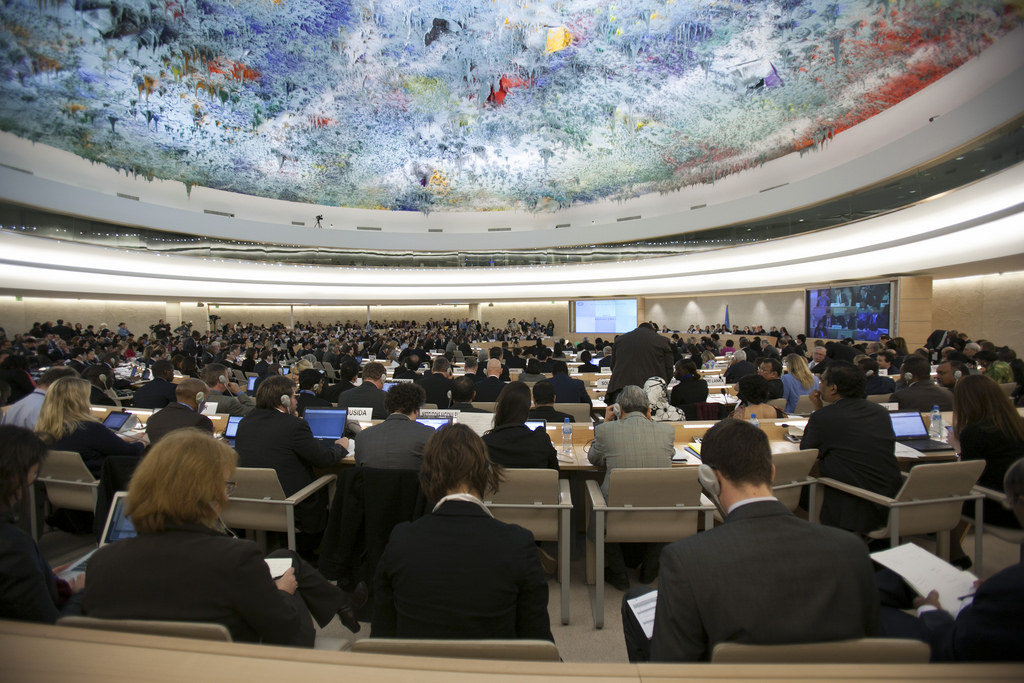
China | UN review is critical chance for countries to change the narrative
Teng Biao, a Chinese human rights defender and visiting scholar at New York University, reflects on how China has rewritten its human rights narrative under Xi Jinping and why governments, at today's UN review, should go all in to end impunity.
For the draft recommendations from the report, click here.
Almost thirty years ago, the world watched as journalists and diplomats documented a brutal massacre of students on Tiananmen Square in Beijing.
Buoyed by the ensuing international outrage and pressure, everyone assumed that China’s efforts to marketize and globalize, to join the WTO and to host the Olympics, would be milestones along a path leading to a more open society. Everyone assumed that if China would just ratify UN treaties, embrace international human rights standards, and advance the rule of law it would become more rights-respecting.
These assumptions were part of a standard narrative, but my version of the story is different.
Since 1989, I committed years of my life to promoting human rights in China. I was repeatedly locked up in black jails, disappeared, and in 2011 detained and subject to torture for more than two months.
Diplomats, who believed that China fit the standard narrative and would comply with the standards it had signed up to, pressed the government about my case. The Chinese authorities replied, saying I had never been detained and that China was ‘a country of rule of law’.
A woman I knew well in Beijing also believed the narrative; she tried for nearly a decade to use the treaties China had signed, the commitments they had made, to advance public participation and transparency. When she got in trouble, I was her defense lawyer.
But in September 2013, this brave human rights defender – Cao Shunli – was stopped at the airport before she boarded her flight for Geneva. Instead of helping provide information for a UN rights review of China, she ended up in incommunicado detention; six months later, she died in custody.
A day later, the Chinese government committed publicly, in Geneva, to take action on recommendations it received during that review, known as the ‘Universal Periodic Review’ or UPR. Many of these were inspired by cases like mine and Cao Shunli’s – to prevent torture, support civil society, and combat reprisals. As far as narratives go, they talked the talk.
Five years have gone by. This week, on November 6th, China will once again undergo a review of its rights record. But with the rise of Xi Jinping to power, a sweeping crackdown has made human rights rhetoric far from reality.
Chinese authorities target lawyers, religious and ethnic minorities, NGOs, and dissenting voices. They leverage big data, extensive surveillance, and the Great Firewall censorship system to create a real-life parallel to Orwell’s 1984. In Xinjiang, upwards of a million Uyghur and Kazakh Muslims are arbitrarily detained, without any legal process, separated from their children and vulnerable to torture, simply because of their beliefs.
In March of this year, President Xi Jinping succeeded in amending the Chinese Constitution to remove term limits, cementing his power and, thus far, impunity for any of those violations.
What we’ve also learned in the last five years is that Chinese government suppression of basic freedoms does not stop at China’s borders.
Chinese influence has gone global, on campuses, in Confucius Institutes and student associations, and in major media outlets. Foreign citizens like Swedish publisher Gui Minhai, or Canadian businessman Xiao Jianhua, or British passportholder and bookseller Li Bo have been disappeared – without ever stepping foot in China.
Human Rights Watch published a report in 2017 highlighting the lengths to which China goes to limit scrutiny of their practices at the UN. One of those victims is human rights lawyer Wang Quanzhang, who was disappeared more than three years ago and who has not yet seen a courtroom, a lawyer of his choosing, or his family.
To our dismay, China has managed to become the second largest economy in the world while hovering near the bottom of international rankings for human rights and democracy. It has, in essence, re-written the narrative.
In this new narrative, international norms are negotiable, rule of law is manipulated, human dignity is debased, democracy is abused, and justice is denied. In this new narrative, corruption and persecution are ignored, perpetrators are immune, and regimes who violate rights are united and smugly resistant to change.
This rights review is not simply an assessment of China’s progress on human rights. It is a test for the credibility of the UN system. Governments – not just those from ‘the West’ but any who want to see an end to abuse and injustice – have a responsibility to speak truth to power where Chinese defenders cannot.
It is a test of whether the international community will stand up to China, indict its crackdown on human rights domestically, and assert a counternarrative to ‘human rights with Chinese characteristics’. Through media, through VPNs, through chat groups and encrypted text, despite the risks, Chinese rights activists are watching.
Sarah M Brooks, Asia advocate at ISHR, also contributed to this piece.
